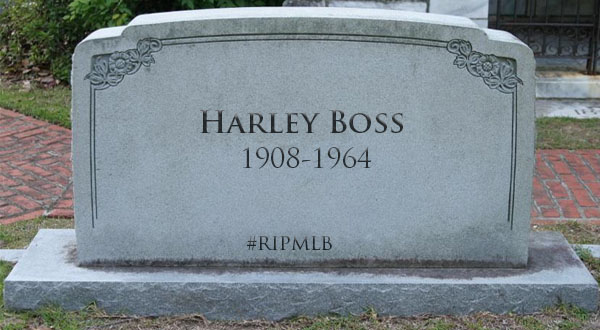![]()
Harley Boss was a first baseman for the Washington Senators (1928-30) and Cleveland Indians (1933). He’d go on to become the head coach of the Vanderbilt baseball team.
Boss was also the central character in a largely forgotten scandal of the early 1930s.
A three-sport athlete at Louisiana Tech and an All-American at football, he chose professional baseball and got a fast start in the Majors, debuting with the Senators while just 19 years old. His chances with Washington were few and far between. In parts of three seasons with the team, he managed just 81 at-bats and a .259 average. Part of that was bad luck. Boss couldn’t snatch the starting job away from veteran Joe Judge and then suffered from illness and a knee injury in succeeding years.
Boss spent the next two seasons in Chattanooga, tearing up pitching with above .300 averages, and, eventually, getting a second chance at the Majors. The Indians picked him up, and he soon snatched the starting first base role away from fellow Louisiana native Ed Morgan. In 112 games, Boss hit .269 and drove in 53 runs.
On April 19, 1933, there was a party in Boss’s Cleveland apartment. One of the guests was 22-year-old Lillian Eloise Mitchell, who was introduced to Boss by a mutual friend. Eventually, they were the only two left in the apartment. After that, the accounts of the night diverge wildly.
Boss claimed that they talked for a while and kissed, and then he suggested Mitchell go home. She said that her time spent with Boss ought to be worth some money. Boss, offended at the allegations, pushed her out the door and gave her 75 cents for cab fare.
Mitchell, on the other hand, accused Boss of drinking beer and then punching her in the face when she tried to resist his advances. She filed a $50,000 lawsuit against the big leaguer, accusing the player of blackening her eyes, breaking a tooth and tearing her skirt and stockings. She tried to escape out the apartment’s fire escape, and Boss pulled her back, handed her her hat and a few coins for cab fare and let her leave.
The trial took place that summer, and it took an hour and a half for the jury to return a not guilty verdict in Boss’s favor. Regardless of what really happened that night, Mitchell was treated terribly in the press. One headline read, “Indian First Sacker Has Punch, Girl Says.” Mitchell’s age, financial status and a previous divorce were all brought up to not-so-subtly to imply her true motives for the lawsuit. Boss’ testimony, on the other hand, included a mention that he had been benched briefly by the Indians for hitting poorly. “By that you mean hitting a baseball?” asked Mitchell’s own attorney, earning a chuckle from the crowd. A character witness from the Indians said that Boss’ behavior was exemplary. It only became clear later in his career that Boss had a temper and was capable of violence when provoked.
In spite of the bad publicity, Boss was offered a contract for the 1934 season, but he held out for several weeks. He eventually reported to the team, but management chose rookie first baseman Hal Trosky over Boss, and he went back to the minors for good. In 155 MLB games, Boss hit .259 with 139 hits, one home run and 61 RBI.
After spending a couple of seasons in New Orleans, Boss signed with the San Francisco Seals in 1936. He stayed with the team for four seasons and batted around .300 each year, but his temper created more headlines than his playing did. He gained a reputation for arguing and harassing umpires and almost caused a brawl in 1938 when an argument over a play at home almost led to punches being thrown between Boss and the ump. Seals manager Lefty O’Doul had to break it up before a riot ensued.
Boss retired and unretired a couple times late in his career when he was sent to a team where he didn’t want to play. His last season was with Clarksville in 1946. Boss was a career .303 hitter in the minors, with 1,743 hits in 1,504 games and 46 home runs.
The longtime minor leaguer was hired as manager of the Clarksville Colts at the start of the 1947 season, but his temper got the best of him again. He was suspended for ten games by the Southern League about a month into his tenure and was fired shortly after that.
Inexplicably, Vanderbilt University decided that Boss would be the perfect candidate to mold young men and made him the head coach of the baseball team in 1960. Perhaps he had mellowed by then. Boss suffered a heart attack in the middle of a game in early 1962 and took two years off to recover, but he came back in 1964.
Though his physician deemed him healthy enough to coach again, fate said otherwise.
Harley Boss died in his sleep on May 15, 1964 from another heart attack. He was 55 years old. It was probably the only thing he ever did peacefully in his life.
ABOUT THE AUTHOR:
Sam Gazdziak writes about baseball-related gravesites and baseball deaths on Instagram, Twitter and Facebook.
Add The Sports Daily to your Google News Feed!

